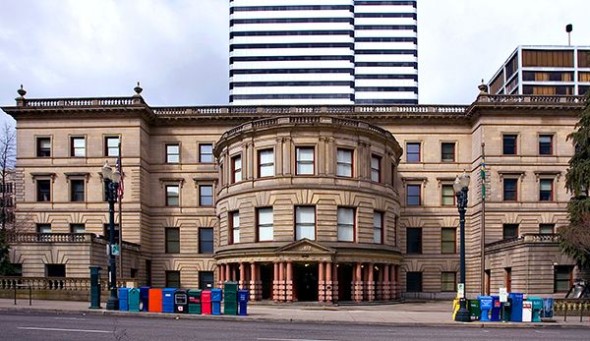Portland Office for Community Technology Returns to Standalone Bureau
Posted on November 19, 2018 by Samuel Pastrick
Tags, Telecommunications

The City of Portland’s Office for Community Technology (OCT) is once again a standalone city bureau. While this change may seem like little more than inside baseball, it represents an important and long overdue update of the City’s governance structure. Above all else, the move will enhance Portland’s approach to visioning, developing, and implementing information and communications technology (ICT) policy.
The move reverses an egregious 2012 decision to demote OCT into the lower level and inward-focused Revenue Division. Locating OCT in the Revenue Division severed a direct connection to a City Commissioner-in-charge and hindered the Office’s overall effectiveness given the need for a higher profile and outward-focused placement within the City’s governance structure. CUB’s two-year public advocacy campaign to elevate OCT’s role in the City and, therein, ensure the brand of visionary ICT policy development and implementation Portlanders need, supports OCT’s return to a standalone bureau.
Over the course of CUB’s public advocacy campaign to promote OCT’s elevation within the City’s governance structure, I have written a lot on the subject. Most recently, I posted an article on the CUB blog highlighting my September testimony before City Council supporting the Multnomah County and City of Portland Digital Equity Action Plan’s (DEAP) year-two report. And as I have done many times over the last two years, I leveraged my testimony to call on Portland City Council to elevate, empower, and fund OCT.
Some brief history illustrates the importance of this advocacy.
In its heyday throughout the 1990s and up until 2012, the Office of Cable Communications and Franchise Management (OCCFM) – later renamed as OCT – was nationally lauded for assertive, innovative, and forward-thinking public interest ICT policy. From commencing the fight to preserve the “open internet” (now more commonly known as “net neutrality”), to expertly negotiating what is arguably the most lucrative cable franchise public benefits package in the country, and to authoring a first-of-its-kind Broadband Strategic Plan (which laid the groundwork for the DEAP), Portland’s OCCFM was the envy of municipal community technology and franchise offices all across the United States. Because of OCCFM’s good work, the City of Portland was known and widely praised for its cutting-edge approach to ICT policy development and implementation.
The burying of OCT in Portland’s governance structure, in a particularly inappropriate setting no less, hampered the office’s visionary work. Nevertheless, OCT has admirably soldiered on since 2012 with what amounts to clipped wings and a remarkably short leash. During this time – and due in no small part to former OCT Manager, Mary Beth Henry; Program Manager, Julie Omelchuck; and Digital Equity Program Coordinator, Rebecca Gibbons – digital equity and inclusion remained a top priority, resulting in the formation of the regional Digital Inclusion Network (on which I represent CUB) and the nationally recognized DEAP.
But OCT’s organizational standing hindered visionary policy and people. By 2016, cracks began to show. After several years of flirting, Google Fiber (not to be confused with Google Applications or other Alphabet Company subsidiaries) abruptly backed out of negotiations to bring their high-speed broadband product to the Portland area. Soon after, Mary Beth Henry retired from the City after more than two decades of public service.
By fall of 2016, CUB began our City Hall advocacy for a stronger OCT. With support from CUB’s Advocacy Directory Janice Thompson, I authored – and presented to City Council – a paper expressing concerns about the City’s commitment (or rather lack thereof) to ICT policy as evidenced by the continued structural dampening of OCT’s effectiveness. Our paper’s underlying argument was that OCT does not, nor will ever, have the needed vision and capacity to assert innovative and forward-thinking ICT policy while located within the Revenue Division. In the end, aided by continued advocacy, our paper helped set off the chain of events ultimately resulting in OCT’s September 2018 promotion within the City’s governance structure. Yet certain events will not fully resolve until Portland City Council approves their Fiscal Year (FY) 2019-2020 budget.
Allow me to explain. Soon after presenting our paper to Council, we forged a new partnership with the Mount Hood Cable Regulatory Commission (MHCRC). The MHCRC contracts staffing from OCT to negotiate and enforce cable service franchise agreements, manage the public benefit resources and assets derived from the franchises, and advocate on behalf of the public interest for Fairview, Gresham, Portland, Troutdale, and Wood Village.
By 2017, a “budget note” sponsored by Commissioner Amanda Fritz buoyed the CUB-MHCRC partnership and an all-out advocacy campaign. Earlier this year, the OCT-related budget note resulted in the hiring of an outside consultant to investigate OCT’s best locational fit within the City’s governance structure. The report, while in some ways underwhelming, did confirm our and MHCRC’s longstanding concerns. The end result was Mayor Wheeler electing to extricate OCT from the Revenue Division, returning the office to its former standalone bureau status within his own portfolio.
The decision by Mayor Wheeler to return OCT to a standalone bureau is certainly worthy of praise. At the same time, after years of diminished standing, this new, scrappy bureau still lacks a Director, long-term strategic vision, and adequate funding in the near term to address the next phase of the DEAP and respond to an increasingly confrontational and preemptive Federal Communications Commission.
Next, we anticipate a City Ordinance to codify OCT’s move. Soon after, the proverbial rubber will meet the road during FY 2019-2020 budget development and the search for a permanent Director. As always, CUB will doggedly monitor the situation and advocate for OCT emphasizing visionary ICT policy that serves all Portlanders.
To keep up with CUB, like us on Facebook and follow us on Twitter!




09/05/22 | 0 Comments | Portland Office for Community Technology Returns to Standalone Bureau